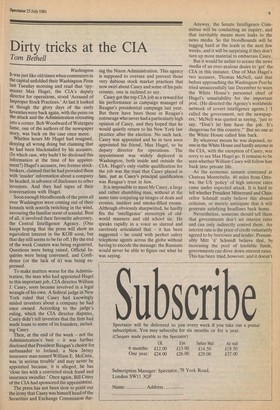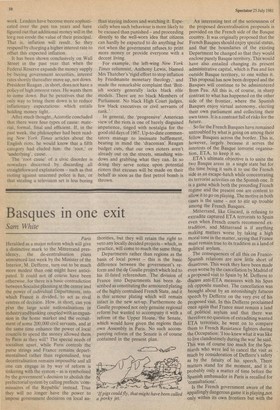Dirty tricks at the CIA
Tom Bethel!
Washington It was just like old times when commuters in the capital unfolded their Washington Posts last Tuesday morning and read that 'spymaster Max Hugel, the CIA's deputy director for operations, stood 'Accused of Improper Stock Practices.' At last it looked as though the glory days of the early Seventies were back again, with the press on the attack and the Administration retreating into a corner. Bob Woodward of Watergate fame, one of the authors of the newspaper story, was back on the case once more.
Whithin hours Mr Hugel had resigned, denying all wrong doing but claiming that he had been blackmailed by his accusers. (In which case, why hadn't he disclosed this information at the time of his appointment?) Hugel's accusers, two former stockbrokers, claimed that he had provided them with 'insider' information about a company he headed, in advance of disclosure to other investors. And they had tapes of their conversations with Hugel.
Soon enough bloodhounds of the press all over Washington were coming out of their kennels with nostrils twitching in the wind, savouring the familiar scent of scandal. Best of all, it involved their favourite adversary, the Central Intelligence Agency. (One keeps hoping that the press will show an equivalent interest in the KGB soon, but that day still seems to be far off.) By the end of the week Concern was being registered, Questions were being raised, Official Inquiries were being convened, and Confidence (or the lack of it) was being expressed.
To make matters worse for the Administration, the man who had appointed Hugel to this important job, CIA director William J. Casey, soon became involved in a legal wrangle of his own. A federal judge in New York ruled that Casey had knowingly misled investors about a company he had once owned. According to the judge's ruling, which the CIA director disputes, Casey didn't tell investors that the firm had made loans to some of its founders, including Casey. Then, at the end of the week — not the Administration's best — it was further disclosed that President Reagan's choice for ambassador to Ireland, a New Jersey insurance man named William E. McCann, was in serious trouble' and may never be appointed because, it is alleged, he has 'close ties with a convicted stock fraud and insurance swindler.' Once again, Bill Casey of the CIA had sponsored the appointment.
The press has not been slow to point out the irony that Casey was himself head of the Securities and Exchange Commission dur ing the Nixon Administration. This agency is supposed to oversee and prevent those very dubious stock market practices that now swirl about Casey and some of his pals: cronies, one is inclined to say.
Casey got the top CIA job as a reward for his performance as campaign manager of Reagan's presidential campaign last year. But there have been those in Reagan's entourage who never had a particularly high opinion of Casey, and they hoped that he would quietly return to his New York law practice after the election. No such luck. Casey was appointed and he in turn soon appointed his friend, Max Hugel, to be deputy director for operations. The appointment was widely deplored in Washington, both inside and outside the CIA. Hugel's only visible qualification for the job was the trust that Casey placed in him, just as Casey's principal qualification was Reagan's trust in him.
It is impossible to meet Mr Casey, a large and rather shambling man, without at the same time conjuring up images of deals and cronies, insiders and smoke-filled rooms. Although obviously sharpwitted, he hardly fits the 'intelligence' stereotype of oldworld manners and old school tie. He speaks rapidly in a voice so slurred and carelessly articulated that — it has been suggested — he could with perfect safety telephone agents across the globe without having to encode the message: the Russians would never be able to figure out what he was saying. Anyway, the Senate Intelligence Committee will be conducting an inquiry, and that inevitably means more leaks to the news media. So the bloodhounds will be tugging hard at the leash in the next few weeks, and it will be surprising if they don't turn up more material to embarrass Casey.
But it would be unfair to accuse the news media of an over-zealous desire to 'get' the CIA in this instance. One of Max Hugel's two accusers, Thomas McNeil, said that before approaching the Washington Post he tried unsuccessfully last December to warn the White House's personnel chief of Hugel's unsuitability for the important post. (He directed the Agency's worldwide network of covert intelligence agents.) 'I called the government, not the newspapers,' McNeil was quoted as saying, 'just to say, "Don't let him have the job. It's dangerous for this country." But no one at the White House called him back.
By whatever means he was deposed, no one in the White House and hardly anyone in the CIA, with the exception of Casey, was sorry to see Max Hugel go. It remains to be seen whether William Casey will follow him back into private life.
As the economic summit convened at Chateau Montebello. 40 miles from Ottowa , the US 'policy' of high interest rates came under expected attack. It is hard to tell whether President Mitterrand and Chancellor Schmidt really believe this absurd criticism, or merely anticipate that it will generate satisfying headlines back home.
Nevertheless, someone should tell them that governments don't set interest rates and can only indirectly control them. An interest rate is the price of credit voluntarily agreed to by borrower and lender. Presumably Mitt 'n' Schmidt believe that, by increasing the pool of lendable funds, governments can drive down interest rates. This has been tried, however, and it doesn't work. Lenders have become more sophisticated over the past ten years and have figured out that additional money will in the lorg run erode the value of their principal. That is, inflation will result. So they respond by charging a higher interest rate to offset this expected inflation.
It has been shown conclusively on Wall Street in the past year that when the Federal Reserve expands the money supply by buying government securities, interest rates shortly thereafter move up ,. not down. President Reagan , in short, does not have a policy of high interest rates. He wants them to come down. But he perceives that the only way to bring them down is to reduce inflationary expectations: which entails holding money tight.
After much thought, Aristotle concluded that there were four types of cause: material, formal, final and efficient. If, in the past week, the philosopher had been reading New York Times articles about the English riots, he would know that a fifth category had eluded him: the 'root,' or 'underlying', cause.
The 'root cause' of a civic disorder is nowadays discerned by discarding all straightforward explanations — such as that rioting against unarmed police is fun, or that stealing a television set is less boring than staying indoors and watching it. Especially when such behaviour is more likely to be excused than punished — and proceeding directly to the well-worn idea that citizens can hardly be expected to do anything but riot when the government refuses to print more money or provide everyone with a decent living.
For example, the left-wing New York Times columnist, Anthony Lewis, blamed Mrs Thatcher's `rigid effort to stop inflation by Friedmanite monetary theology,' and made the remarkable complaint that 'British society generally lacks black role models. There are no black Members of Parliament. No black High Court judges, few black executives or civil servants of rank.'
In general, the 'progressive' American view of the riots is one of barely disguised impatience, tinged with nostalgia for the good old days of 1967. Up-to-date commentators manage to insinuate bafflement, bearing in mind the 'draconian' Reagan budget cuts, that our own rioters aren't already out on the streets, smashing windows and grabbing what they can. In so doing they serve notice upon potential rioters that excuses will be made on their behalf as soon as the first petrol bomb is thrown.



































 Previous page
Previous page